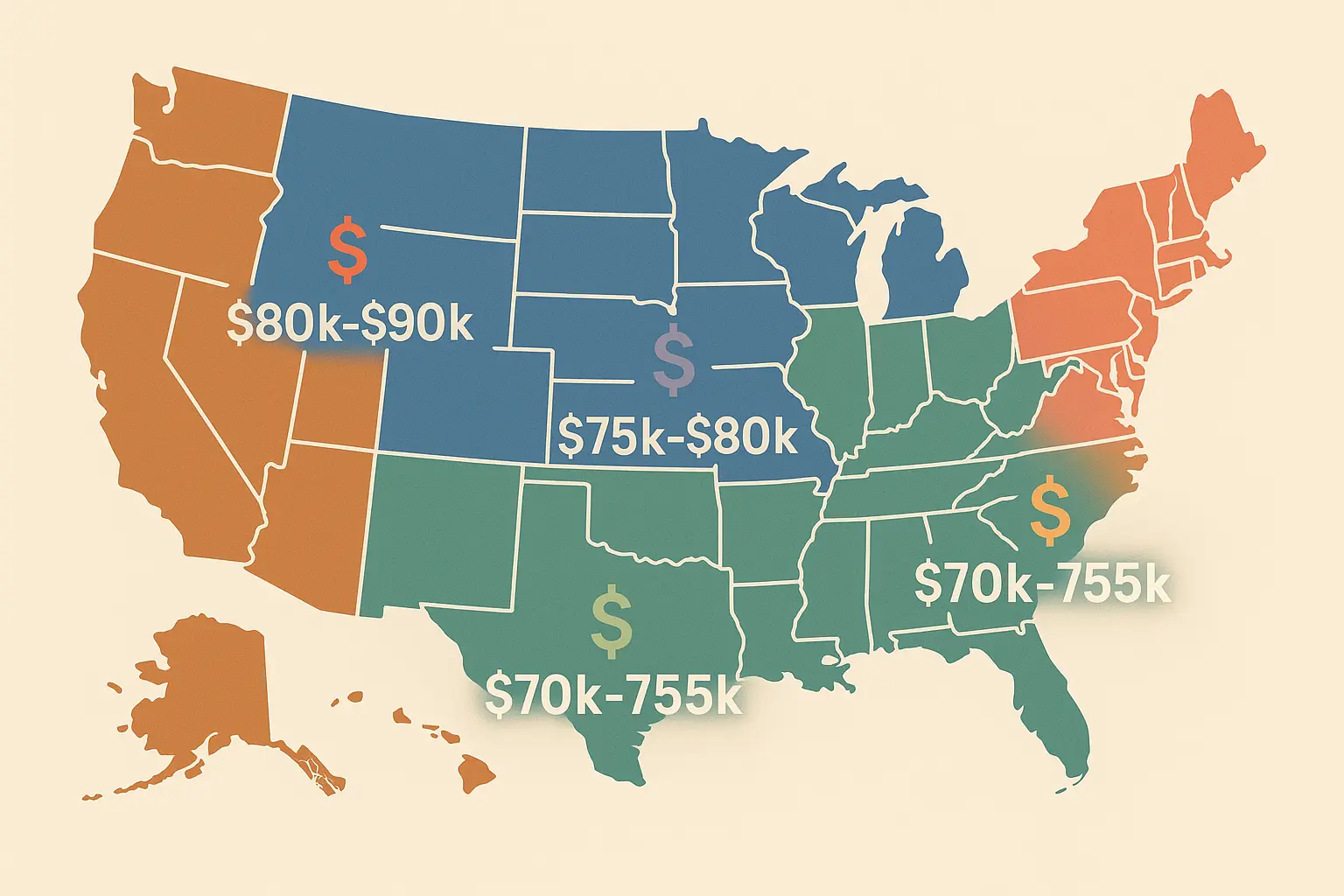Table of Contents
-
What Walmart Store Managers Actually Make
-
Climbing the Ladder: Where the Real Money Is
-
How to Actually Get Paid What You’re Worth
-
Education: What You Need vs. What Helps
-
The Bottom Line
TL;DR
-
Walmart store manager salaries range from $80,000 to $150,000+ annually, with huge geographic differences
-
Bonuses, stock options, and benefits can add $20,000-$40,000 in total value
-
Internal promotions lead to district manager roles ($150,000-$200,000+) and regional positions ($250,000+)
-
Digital retail skills, team leadership, and cost control drive faster salary growth
-
Successful negotiations require data, documentation, and timing—not just asking for more money
-
College degrees help but aren’t required—results matter more than diplomas
What Walmart Store Managers Actually Make
Let me cut straight to the chase: Walmart store managers earn between $80,000 and $150,000 in base salary, but that’s just the starting point.
After digging through salary data and talking to actual managers, here’s what I found. The average jumped to $128,000 recently—that’s a solid 9% bump from last year, according to Retail Dive. But here’s the kicker: location makes a huge difference.
Managing a store in rural Texas? You might start around $85,000. Same job in San Francisco? Try $120,000. The cost of living evens things out somewhat, but those coastal premiums are real.
Where You Work Changes Everything
Geographic location can swing your pay by $30,000 or more. High-cost areas like California, New York, and major metro areas typically offer 15-30% salary premiums compared to smaller towns.
Store managers in expensive coastal cities often start around $110,000-$130,000, while those in rural areas might begin closer to $80,000-$95,000. Don’t let the lower numbers in small towns discourage you though—your dollar goes a lot further there.
Experience Pays Off Big Time
Your years in retail management directly impact your earning potential. Here’s how it breaks down:
-
Entry Level (0-2 years): $80,000 – $95,000 base, up to $123,500 with location premiums
-
Mid-Level (3-5 years): $95,000 – $120,000 base, up to $156,000 total potential
-
Senior Level (5+ years): $120,000 – $150,000 base, up to $195,000 with all premiums
Career progression happens faster than you might expect. I’ve seen managers move from assistant roles to store management within 2-3 years, then advance to district positions within another 3-5 years.
Sarah from Texas proves this works. She went from assistant manager at $45,000 in 2020 to store manager at $95,000 in 2022. Now she’s eyeing a district role worth $160,000. Her secret? She focused on what actually moves the needle—team development and keeping costs down.
The Real Money Makers: Bonuses and Benefits
Here’s where things get interesting. Base salary is just part of the story.
Performance bonuses can range from $5,000 to $20,000+ quarterly, depending on your store’s performance against targets. Annual profit-sharing adds another $10,000-$30,000 for successful managers.
But wait, there’s more. Store managers can now earn annual bonuses up to 200% of their base salary. That means a manager earning $128,000 could potentially receive an additional $256,000 in performance-based compensation annually, according to Retail Dive.
Stock options and benefits add another $20,000-$40,000 in total value. The stock purchase program lets employees buy Walmart shares at a 15% discount, plus the company matches contributions. Given Walmart’s market position, this represents serious long-term wealth building potential.
Walmart also added $20,000 in stock grants to Supercenter store manager packages, meaning people in that role could potentially earn over $400,000 annually when combining everything, according to Retail Dive.
Climbing the Ladder: Where the Real Money Is
Here’s what nobody tells you about moving up at Walmart: most promotions come from within. That’s actually good news if you’re already there.
The path is pretty straightforward:
-
Assistant Manager → Store Manager (2-3 years)
-
Store Manager → District Manager ($150,000-$200,000)
-
District → Regional ($250,000+)
But here’s where it gets really interesting. Market managers who nail their bonuses can now earn between $420,000 and $620,000 annually, according to Axios. Yeah, you read that right.
What Actually Gets You Promoted
Skip the corporate training buzzwords. Here’s what really matters:
-
Your store’s numbers improve consistently
-
You develop people who get promoted
-
You solve problems instead of creating them
-
You embrace the digital stuff (online orders, pickup, delivery)
For professionals considering retail management careers, having proper documentation of your qualifications matters. Whether through college degrees or completing your high school diploma, keeping your educational credentials in order can strengthen your advancement opportunities.
Your Career Advancement Checklist:
-
Complete Walmart Academy training program
-
Hit quarterly performance targets consistently
-
Develop and mentor at least 2 assistant managers
-
Implement cost-saving initiatives with measurable results
-
Keep employee satisfaction scores above district average
-
Get digital retail certifications
-
Build relationships with district and regional leadership
-
Document all major achievements
Mark in Florida figured this out. He cut employee turnover from 85% to 45% by actually talking to his people. Weekly one-on-ones, flexible schedules, recognizing good work. Saved the company $180,000 in hiring costs and got himself a $15,000 raise plus fast-track to district manager.
Skills That Pay Extra
Digital retail skills are your golden ticket right now. If you can run online operations smoothly, you’re instantly more valuable. Same with financial management—show you understand P&L statements and budget optimization, and you’ll stand out.
High-Value Skills and Their Impact:
-
Digital Retail: E-commerce operations, omnichannel management (15-25% salary premium, 6-12 months faster advancement)
-
Team Leadership: Talent development, retention improvement (10-20% premium, 12-18 months faster)
-
Operational Excellence: Cost control, efficiency optimization (12-18% premium, 9-15 months faster)
-
Financial Management: P&L analysis, budget optimization (18-22% premium, 6-12 months faster)
Understanding pickup and delivery operations, managing online inventory, and optimizing digital customer experiences aren’t nice-to-have skills anymore—they’re essential for advancement.
Store managers who demonstrate exceptional ability to develop talent and reduce employee turnover receive priority consideration for promotion. Your success in growing people often matters more than short-term financial metrics when advancement decisions are made.
How to Actually Get Paid What You’re Worth
Most managers are terrible at salary negotiations because they wing it. Don’t be most managers.
Do Your Homework First
You can’t negotiate effectively without data. Research comparable positions at Target, Costco, Home Depot, and other major retailers to establish market-rate expectations. But don’t just quote numbers from online sources—understand the complete compensation packages competitors offer.
Your Salary Negotiation Prep Template:
Market Research:
-
Competitor base salaries and total compensation ranges
-
Industry bonus averages
-
Geographic adjustment factors
-
Benefits and stock option comparisons
Performance Documentation:
-
Sales growth you achieved
-
Cost savings you implemented
-
Employee retention improvements
-
Customer satisfaction score increases
Value Proposition:
-
Your top 2-3 achievements with quantifiable impact
-
Problems you solved that saved money
-
People you developed who got promoted
Present Your Case Like a Business Decision
Don’t ask for more money because you need it. Show them why paying you more makes financial sense.
Jennifer in Ohio nailed this approach. She walked into her review with data showing her store’s 12% sales increase, 8% cost reduction, and 15-point jump in customer satisfaction scores. Got a $12,000 raise and a spot in the district manager program. Her systematic documentation made the business case undeniable.
Document Everything That Matters:
-
Revenue and profit impact from your management
-
Year-over-year sales growth
-
Inventory turn improvements
-
Labor cost optimization results
-
Customer satisfaction score increases
-
Employee promotion rates under your leadership
-
Training programs you implemented
-
Recognition initiatives that boosted morale
Timing Matters:
-
Right after strong quarterly results
-
During annual reviews
-
When you’re being considered for promotion
-
Never during crisis periods or budget cuts
Education: What You Need vs. What Helps
Real talk: you don’t need a college degree to become a Walmart store manager. Experience and results matter more than diplomas.
Most store manager positions require high school diplomas or equivalent, though many successful candidates have college degrees or specialized retail training. The company prioritizes proven performance and leadership ability over formal educational credentials.
Many successful managers wonder about educational requirements and whether missing credentials could impact their advancement. For those who need to replace a lost diploma for professional display or those considering whether getting a college degree is worth the investment, understanding Walmart’s flexible approach provides valuable perspective.
Degrees: Nice to Have, Not Must Have
Business administration, retail management, or related degrees are preferred but not always required. Equivalent experience and proven performance often substitute for formal education, though degrees can accelerate advancement timelines and open doors to corporate opportunities.
Don’t let lack of a college degree discourage you from pursuing store management roles. Walmart’s promotion-from-within culture values practical experience and demonstrated results over academic credentials.
Professional Development That Actually Pays Off
Strategic investments in additional certifications, industry conferences, and specialized training can differentiate you and justify higher compensation levels.
Certifications Worth Pursuing:
-
National Retail Federation programs
-
Supply Chain Management Professional credentials
-
Digital marketing certifications aligned with omnichannel strategy
-
Leadership and team management training
Professional development often requires proper documentation of achievements and certifications. Whether you need to display certificates on your wall professionally or understand what constitutes a certificate versus a degree, having the right credentials properly presented can enhance your professional image during advancement discussions.
Your Professional Development Checklist:
-
Complete industry-specific certifications (NRF, SCMP)
-
Attend annual retail conferences and networking events
-
Take online courses in digital marketing and e-commerce
-
Develop financial analysis and P&L management skills
-
Learn advanced inventory management systems
-
Stay current with retail technology trends
-
Build relationships with industry professionals
The key is picking education that solves real problems you face daily. Don’t collect certificates just to have them—invest in skills that make you better at your job and more valuable to the organization.
The Bottom Line
Walmart store manager jobs can be genuinely lucrative if you understand the system. Base salary is just the starting point—bonuses, stock options, and advancement opportunities can push your total compensation well into six figures.
The company rewards performance, not just showing up. Focus on measurable results: sales growth, cost control, team development, and customer satisfaction. Document everything and use that data when it’s time to negotiate.
The path to bigger money is clear: internal promotion to district and regional roles where the real wealth lives. Market managers earning $400,000-$600,000+ aren’t unicorns—they’re people who mastered the fundamentals and consistently delivered results.
Even as a store manager, if you’re good at what you do and can prove it with numbers, you’ll do well financially. The recent salary increases and enhanced bonus structures show Walmart is serious about retaining top talent.
Most importantly, don’t let lack of formal education hold you back. Walmart values what you can do more than where you went to school. Show results, develop people, embrace digital transformation, and the money will follow.
For professionals considering store management careers or current managers seeking advancement, having proper documentation of your educational achievements remains important for career progression. Whether you need backup copies of diplomas for professional display or replacement documents for advancement discussions, ValidGrad’s high-quality replica diploma service ensures your educational credentials are properly documented and professionally presented. With fast turnaround times and authentic-looking replicas, you can focus on advancing your career while keeping your original documents safe.
The opportunity is there. The question is whether you’re ready to grab it.









